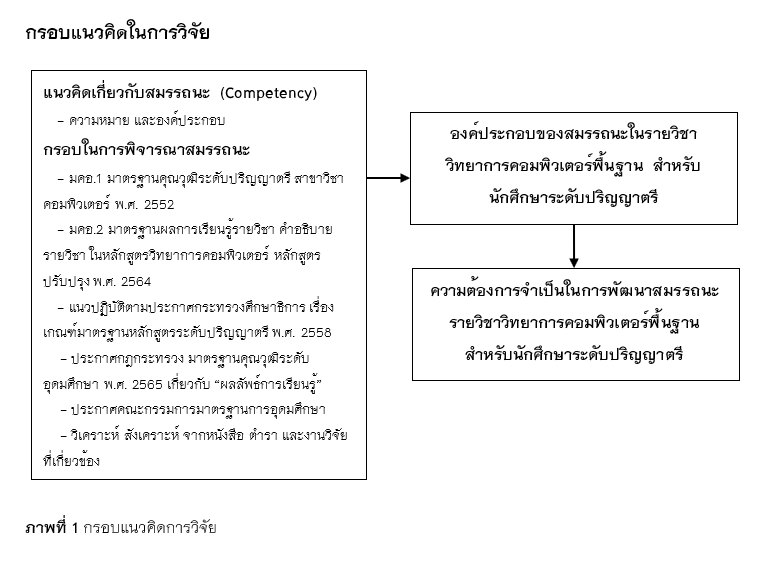A Study of Components and Needs Assessment for Competency-Based Development of Fundamentals of Computer Science Course for Undergraduate Students
Main Article Content
Abstract
This research is part of a study on the Competency-Based Curriculum Development of the Fundamentals of Computer Science Course Based on Blended Learning Concepts and Cooperative Learning Theory for Undergraduate Students. This research aimed to 1) study the components of competency in the fundamentals of computer science courses for undergraduate students; and 2) investigate the current situation, expected conditions, and need assessment for developing competencies in the fundamentals of computer science courses. The data collection in Phase 1 involved interviewing six qualified individuals to inquire about the components of competency in the course and evaluate the appropriateness of these components and indicators. In Phase 2, the sample group consisted of first-year computer science students in the academic year 2023 from four upper northeastern regional Rajabhat universities, with a minimum sample size of 80% of 110 students, using proportional stratified sampling. The research findings included evaluating the appropriateness of components and indicators in the course, revealing 4 competencies with 77 indicators. Firstly, competency in accessing, evaluating, and managing computer science data has 16 indicators. Second, competency in analyzing and solving computer problems has 47 indicators. Thirdly, teamwork competency had 7 indicators. Lastly, competency in ethics and a good attitude toward computer operations had 7 indicators. The overall appropriateness was highest (mean=4.70, S.D.=0.52). In addition, the needs assessment results for developing competency were 4 competencies sorted by the value of need assessment from highest to lowest. Firstly, competency in analyzing and solving computer problems was 0.55. Secondly, competency in accessing, evaluating, and managing computer science information was 0.42. Thirdly, competency in ethics and a good attitude towards computer operations was 0.35. Lastly, teamwork competency was 0.33. The overall need assessment index for all four competencies was equal to 0.41, meaning that the conditions exist at present. There is less than expected condition by the rate of change in development from the actual conditions at present, leading to an anticipated condition of 0.41 or 41%.
Downloads
Article Details

This work is licensed under a Creative Commons Attribution-NonCommercial-NoDerivatives 4.0 International License.
References
Academic Office. (2014). Summary of issues in Thailand's educational reforms. Bangkok: Secretariat of the House of Representatives. [in Thai]
Clear, A., Clear, T., Vichare, A., Charles, T., Frezza, S., Gutica, M., …, Szynkiewicz, J. (2020). Designing computer science competency statements: A process and curriculum model for the 21st Century. In ITiCSE-WGR '20: Proceedings of the Working Group Reports on Innovation and Technology in Computer Science Education (pp. 211-246), June 17-18 2020, Trondheim, Norway. Retrieved from https://dl.acm.org/doi/pdf/10.1145/3437800.3439208
Department of Computer. (2021). Bachelor of science program, computer science revised curriculum 2021. Sakon Nakhon: Faculty of Science and Technology, Sakon Nakhon Rajabhat University. [in Thai]
Department of Computer. (2022). Self-assessment report of the bachelor of science program, computer science academic year 2021. Sakon Nakhon: Faculty of Science and Technology, Sakon Nakhon Rajabhat University. [in Thai]
Good, C. V. (1973). Dictionary of education. (3rd ed.). New York: McGraw-Hill.
HREX.asia. (2021). Strengthen the competency of personnel promote effective human resource management in the organization. Retrieved from https://th.hrnote.asia/orgdevelopment/190624-competency/ [in Thai]
Jobs DB (Thailand) Recruitment Company Limited. (2024). In-depth look at software developer, the dream career of the new generation. Retrieved from https://th.jobsdb.com/th/career-advice/article/software-developer [in Thai]
Kaewmanee, P., Kasinant, C., Chumruksa, C., & Sirikulpipat P. (2024). A needs assessment for developing a new normal Massive Open Online Course (MOOC) learning system to promote creativity of student teachers of Rajabhat Universities in the Southern Region. Journal of graduate research, 15(1), 93-108. [in Thai]
Kelly, K. T. (1998). Clinical and staff development. (2nd ed.). Philadelphia: Lippincott-Raven.
McClelland, D. C. (1973). Testing for competence rather than for "intelligence". American Psychologist, 28(1), 1-14. Retrieved from https://www.therapiebreve.be/documents/mcclelland-1973.pdf
Ministry of Education. (2017). The basic education core curriculum B.E. 2560 (A.D. 2017). Retrieved from https://www.ipst.ac.th/curriculum [in Thai]
Nwokeji, C. J., Stachel, R., Holmes, T., & Orji, O. R. (2019). Competencies Required for Developing Computer and Information Systems Curriculum. In 2019 IEEE Frontiers in Education Conference (FIE) (pp. 1-9), Covington, KY, USA.
Office of the Education Council. (2017). Research and development of models for curriculum development and competency-based teaching and learning according to the national qualifications framework. Bangkok: Prikwan Graphics Ltd. [in Thai]
Panlert, C. (2019). Competency-based curriculum and student quality development. Academic Journal, 22(1), 22-30. [in Thai]
Parry, S. B. (1998). Evaluation the impact of training Alexandria. Virginia: American Society for training and Development.
Phiwma, N., Mutchima, P., & Pantrakul, S. (2016). IT competency development guidelines for Suan Dusit university students. Panyapiwat Journal, 8(Special), 234-247. [in Thai]
Rassametummachot, S. (2010). Competency based learning. Bangkok: Sirivatana Interprint. [in Thai]
Saelow, W., Yuangsoi, P., & Roungrong, P. (2022). The development of TPACK model online instruction to promote team work for undergraduate students. STOU Education journal, 15(2), 102-116. [in Thai]
Sakolkijrungroj, S. (2023). The synthesis of definition, components, and indicators of digital literacy skills for Sukhothai Thammathirat Open University graduate students. Electronic Journal of Open and Distance Innovative Learning, 10(1), 82-97. [in Thai]
Sakulphram, S., Prasittichok, P., Jirangsuwan, N., & Klaykaew, K., K. (2022). The effects of instructional media to cultivate moral behavior through social media for undergraduate students. Journal of Behavioral Science, 28(1), 61-79. [in Thai]
Slavin, E. R. (1995). Cooperative learning theory: Theory, research and practice. Boston: Allyn & Bacon.
Thianboocha, A. (2016). A curriculum for higher education focusing on competency-based achievement. Journal of Chandrakasemsarn, 22(43), 33-47. [in Thai]
Wongwanich, S. (2007). Needs assessment research. (2nd ed.). Bangkok: Chulalongkorn University Press. [in Thai]
Zuckerberg, M. (2022). It’s just exceptionally rare to find people’ with both ‘IQ and EQ. Retrieved from https://www.cnbc.com/2022/04/20/mark-zuckerberg-sheryl-sandbergs-superpower-is-combination-of-iq-eq.html


